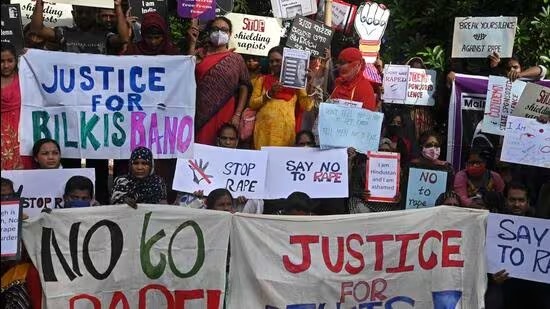Introduction:
The case of Bilkis Bano, a 21-year-old woman who was gang-raped and witnessed the murder of seven family members during the 2002 Gujarat riots, has recently resurfaced in the public eye. The premature release of the 11 convicts responsible for these heinous crimes has raised serious questions about the legal and moral implications of the remission policy in India.
Background:
In 2008, the 11 convicts were sentenced to life imprisonment by Justice U. D. Salvi in a trial held in Mumbai. However, in August 2022, the Gujarat government approved the remission of their sentences based on the state’s 1992 remission policy, leading to their release. This decision has sparked a heated debate on the misuse of the remission policy and its potential impact on society.
Legal Concerns:
The handling of the remission application by the Gujarat government has raised several legal concerns. According to the Criminal Procedure Code (CrPC), the application should have been processed by Maharashtra, where the sentencing took place, rather than Gujarat, where the crime occurred. Moreover, the opinion of the presiding judge of the convicting court, which is crucial in such cases, was not obtained as required by law.
The Supreme Court has previously held that the trial court’s opinion should not be considered a mere formality but a critical safeguard against arbitrary remissions. Despite the court’s characterization of the crime as the “worst form of hate crime and a crime against humanity,” the government seemingly disregarded these words when making its decision.
Remission Policy and Its Shortcomings:
In Laxman Naskar v. Union of India, the Supreme Court had outlined five criteria for considering remission, with the first criterion assessing whether the offence was an isolated act without societal repercussions. In the Bilkis Bano case, it is evident that the gang rape and murder would have had a profound impact on society’s conscience.
Furthermore, the Supreme Court has ruled that a life sentence does not automatically entitle a convict to early release after completing 14 years in prison in Sangeet v. State of Haryana. Instead, remission should be evaluated on a case-by-case basis, considering factors such as the societal impact of the crime, the likelihood of recurrence, and the convict’s potential for rehabilitation.
In this case, it appears that these legal precedents were not adequately considered, and the Gujarat government released the convicts without thoroughly assessing their reformation. Instances of parole violations and concerns raised by Bilkis Bano and legal experts further highlight the need for a more stringent evaluation process.
The Way Forward:
The premature release of the convicts in the Bilkis Bano case exposes significant deficiencies in the remission policy. To ensure justice and maintain public safety, it is essential to re-evaluate the current system of pardon and remission, which grants power to the executive.
A more comprehensive approach to assessing a convict’s reformation should be adopted, taking into account factors such as the societal impact of the crime, the convict’s post-conviction conduct, and their potential for successful reintegration into society. Psychological evaluations and detailed reports on the convict’s progress could provide valuable insights in this regard.
Conclusion:
The Bilkis Bano case serves as a stark reminder of the need for a more robust and fair remission policy in India. By addressing the legal and moral shortcomings exposed by this case, we can work towards a justice system that prioritizes the well-being of victims, ensures the reformation of convicts, and upholds the principles of justice and public safety.
Contributed by-
Saachi Minocha
National Law University, Jodhpur (2023-28)

